Antioxidants for Stress Management and Cortisol Control
Introduction
Stress is not just an emotional state — it’s a biochemical storm. When you’re under constant pressure, your cells produce more free radicals, your immune system becomes inflamed, and your cortisol levels stay elevated for far too long.
Over time, this oxidative stress — the imbalance between free radicals and antioxidants — begins to damage tissues, disrupt hormones, and drain your energy. But here’s the good news: your body has a built-in defense system against stress, and it runs on antioxidants.
Antioxidants are molecules that protect your cells from damage, helping calm inflammation and regulate cortisol. They’re like microscopic peacekeepers, restoring stability to a body caught in fight-or-flight chaos.
This article explores how antioxidants help manage stress at the cellular level, balance cortisol, and protect your brain and body from burnout — naturally. 🌸
Looking for supplements for This? Click here.
🌞 What Happens to Your Body Under Stress
When you experience stress — whether from work, emotional strain, or lack of sleep — your hypothalamus activates the HPA axis (hypothalamic-pituitary-adrenal system).
This leads to the release of cortisol, your main stress hormone.
In small bursts, cortisol is helpful. It gives you energy, focus, and motivation. But when stress becomes chronic, cortisol production goes into overdrive.
High cortisol causes:
Increased inflammation
Blood sugar fluctuations
Muscle breakdown
Fatigue and brain fog
Poor sleep and mood instability
It also increases the production of reactive oxygen species (ROS) — unstable molecules that cause oxidative stress and cellular damage.
Over time, oxidative stress becomes one of the main drivers of premature aging, fatigue, and hormone imbalance. 🌿
🌿 What Are Antioxidants?

Antioxidants are compounds that neutralize free radicals before they can damage your cells.
They work like shields — preventing oxidative stress from spiraling out of control.
Your body produces some antioxidants naturally (like glutathione and superoxide dismutase), but chronic stress depletes them. That’s why dietary antioxidants — from vitamins, minerals, and plant compounds — are essential for long-term resilience.
Think of antioxidants as stress vitamins for your cells — they don’t just prevent disease; they help your body handle stress better. 🌸
🌞 How Oxidative Stress Raises Cortisol
Oxidative stress and cortisol are deeply interconnected.
Oxidative stress activates the HPA axis, signaling your body to produce more cortisol.
Cortisol itself increases oxidative stress by suppressing antioxidant defenses in cells.
This creates a vicious cycle — stress → cortisol → oxidative damage → more stress.
The result? Fatigue, inflammation, and emotional instability.
Antioxidants help by breaking this cycle — calming inflammation, restoring balance, and allowing cortisol levels to normalize naturally. 🌿
🌸 Key Antioxidants for Cortisol and Stress Regulation
Let’s explore the most important antioxidants for stress resilience and hormonal balance.
🌿 Vitamin C: The Adrenal Defender
Vitamin C is concentrated in your adrenal glands — the organs that produce cortisol. Under stress, your body burns through vitamin C rapidly.
It helps:
Regulate cortisol production
Support adrenaline and norepinephrine balance
Strengthen immune function
Protect adrenal cells from oxidative damage
Clinical studies show that people who supplement with vitamin C have lower cortisol levels during physical and emotional stress.
Best sources: citrus fruits, kiwi, bell peppers, camu camu, rose hips.
Supplement dose: 500–1000 mg daily, preferably in divided doses. 🌞
🌸 Vitamin E: The Cellular Protector
Vitamin E is a fat-soluble antioxidant that protects cell membranes from oxidative stress. It works synergistically with vitamin C to maintain adrenal and brain health.
Chronic stress increases lipid peroxidation — damage to fatty tissues in your brain and endocrine organs. Vitamin E prevents this process, helping you maintain focus and emotional stability.
Best sources: almonds, sunflower seeds, avocado, olive oil.
Supplement dose: 100–200 IU daily. 🌿
🌿 Glutathione: The Master Antioxidant
Glutathione is produced naturally in your body, but stress, toxins, and poor diet deplete it. It’s essential for detoxification, immune health, and cortisol balance.
Low glutathione levels correlate with fatigue, poor stress recovery, and inflammation.
You can support glutathione by consuming its building blocks:
N-acetyl cysteine (NAC)
Alpha-lipoic acid (ALA)
Sulforaphane (from broccoli sprouts)
Together, these compounds rejuvenate cellular defense systems and lower cortisol by calming inflammation at its root. 🌸
Looking for supplements for This? Click here.
🌞 Coenzyme Q10 (CoQ10): The Energy Stabilizer
CoQ10 is vital for mitochondrial energy production — the “batteries” of your cells.
Chronic stress impairs mitochondrial function, leading to fatigue and cortisol imbalance. CoQ10 restores this energy flow while protecting mitochondria from oxidative damage.
It’s especially beneficial for people dealing with adrenal fatigue or burnout.
Best sources: oily fish, organ meats, peanuts, spinach.
Supplement dose: 100–200 mg per day (ubiquinol form preferred). 🌿
🌿 Polyphenols: Nature’s Stress Relievers
Polyphenols are plant-based antioxidants found in colorful fruits, vegetables, and teas. They regulate the gut-brain axis, lower inflammation, and help modulate cortisol response.
Powerful polyphenols include:
Quercetin (apples, onions, capers): reduces inflammation and stabilizes blood sugar.
Resveratrol (grapes, berries): protects brain cells and supports stress resilience.
Curcumin (turmeric): lowers cortisol and boosts serotonin.
EGCG (green tea): enhances calm alertness by balancing dopamine and cortisol.
A diet rich in polyphenols is one of the most powerful natural defenses against oxidative stress and burnout. 🌸
🌞 Selenium: The Hormone Regulator
Selenium is a trace mineral that helps produce antioxidant enzymes and supports thyroid and adrenal health.
Low selenium has been linked to elevated cortisol, anxiety, and sluggish metabolism.
Best sources: Brazil nuts (just 1–2 per day), eggs, tuna, sardines. 🌿
🌿 Zinc: The Cortisol Modulator
Zinc regulates the HPA axis, helping prevent overstimulation of the adrenal glands. It’s also crucial for neurotransmitter production, immune balance, and wound healing.
Stress depletes zinc rapidly, which is why many people under chronic pressure benefit from replenishment.
Best sources: pumpkin seeds, oysters, beef, lentils.
Supplement dose: 15–30 mg per day. 🌸
🌸 Alpha-Lipoic Acid (ALA): The Mitochondrial Protector
ALA is both water- and fat-soluble, meaning it can protect almost every part of your cell. It regenerates other antioxidants like vitamin C and E and reduces insulin-related cortisol spikes.
It’s particularly useful for those with metabolic stress — fatigue after meals, cravings, or blood sugar instability. 🌿
🌿 Adaptogenic Antioxidants: Dual Power
Some herbs combine antioxidant and adaptogenic properties, making them powerful allies for cortisol control:
Ashwagandha: lowers cortisol and improves sleep quality.
Rhodiola Rosea: enhances focus and reduces fatigue.
Holy Basil (Tulsi): acts as an antioxidant while promoting calm alertness.
Schisandra Berry: improves liver detoxification and antioxidant defense.
These adaptogenic antioxidants not only protect your cells but help your nervous system stay balanced during daily stress. 🌸
🌞 Antioxidants and the Brain
Your brain is especially vulnerable to oxidative stress because it consumes 20% of your oxygen supply.
When free radicals build up, they damage neurons and impair neurotransmitter balance — particularly serotonin and dopamine. This leads to anxiety, fatigue, and cognitive fog.
Antioxidants like vitamin C, CoQ10, and resveratrol help protect brain tissue, improving focus, mood, and motivation under stress.
Even more impressively, they support neuroplasticity — the brain’s ability to adapt and learn, helping you recover emotionally from stress faster. 🌿
🌸 The Role of Antioxidants in Sleep and Cortisol Rhythm
Cortisol follows a natural circadian rhythm — high in the morning to wake you, low at night for rest.
Oxidative stress disrupts this rhythm by stimulating nighttime cortisol, making it difficult to fall asleep.
Antioxidants restore this balance by calming inflammation in the brain and regulating melatonin production.
For example:
Vitamin C and magnesium improve sleep quality.
Melatonin itself is an antioxidant that protects mitochondria.
Polyphenols from chamomile or tart cherry support natural sleep onset. 🌙
When you sleep well, your cortisol rhythm resets — and your body’s antioxidant systems regenerate. 🌿
🌞 Antioxidants, Gut Health, and Cortisol

The gut produces both stress hormones and antioxidant enzymes. A balanced microbiome can buffer oxidative stress by producing short-chain fatty acids (SCFAs) like butyrate.
But when stress disrupts gut flora, free radicals increase and cortisol rises.
Antioxidants from colorful foods — berries, leafy greens, green tea — feed beneficial bacteria, creating a feedback loop of calm:
Better gut health → lower inflammation → reduced cortisol. 🌿
🌸 Lifestyle Practices That Boost Antioxidant Defenses
Supplements help, but lifestyle matters most. You can build natural antioxidant resilience by:
Eating colorful foods daily: berries, greens, citrus, and spices.
Avoiding processed foods and refined oils that deplete antioxidants.
Getting regular exercise: moderate activity increases your body’s own antioxidant enzymes.
Practicing deep breathing or meditation: both lower cortisol and oxidative stress.
Want to try Breathwork? Click Here.
Prioritizing sunlight and sleep: both regulate your circadian antioxidant rhythm. 🌞
🌿 The Emotional Layer: Oxidative Stress and Mood
When your body is oxidized, you feel it emotionally — irritability, overwhelm, even hopelessness.
Antioxidants lighten this load, not just biochemically but psychologically. They create the internal conditions for calm — oxygen flows better, mitochondria produce energy efficiently, and cortisol stops hijacking your nervous system.
You begin to feel more “you” again — present, balanced, alive. 🌸
🌸 The Synergy of Antioxidants and Cortisol Recovery
The real magic happens when antioxidants work together.
For example:
Vitamin C regenerates vitamin E.
Glutathione recycles both.
CoQ10 protects mitochondria that use these nutrients for energy.
This synergy means that a diet rich in varied antioxidants — rather than relying on one supplement — provides far greater resilience.
Balance, not excess, is the key. 🌿
🌿 Realistic Results Timeline
1–2 weeks: Improved energy and focus, less fatigue after stress.
3–4 weeks: Better sleep, more stable mood, reduced tension.
6–8 weeks: Noticeable reduction in inflammation and cortisol symptoms (e.g., fewer sugar cravings, improved recovery).
3 months+: Deep systemic balance — steady energy, emotional clarity, and calm strength. 🌸
🌙 The Takeaway
Antioxidants are more than anti-aging molecules — they’re your body’s defense team against modern stress.
By protecting your cells from oxidative damage, they help regulate cortisol, improve resilience, and promote emotional calm.
Whether from food, supplements, or mindful living, antioxidants remind your body how to return to balance — energy without anxiety, alertness without tension, calm without fatigue.
The result? You don’t just survive stress — you thrive through it. 🌿✨
Looking for online therapy ? Click Here.
📚 References
McEwen BS. “Protective and Damaging Effects of Stress Mediators.” New England Journal of Medicine, 1998.
Carr AC, Maggini S. “Vitamin C and Stress: Antioxidant and Hormonal Interactions.” Nutrients, 2017.
Liu J et al. “Antioxidant Nutrients and Adrenal Function.” Journal of Nutrition and Metabolism, 2015.
Powers SK et al. “Exercise-Induced Oxidative Stress and Antioxidant Protection.” Physiological Reviews, 2011.
Kurutas EB. “The Importance of Antioxidants in Oxidative Stress.” Journal of Clinical Medicine, 2016.
Manosso LM et al. “Antioxidant Mechanisms in Stress-Related Disorders.” Frontiers in Behavioral Neuroscience, 2019.
Seifried HE et al. “Antioxidants as Modulators of the Stress Response.” Free Radical Biology & Medicine, 2007.
Chrousos GP. “Stress and Disorders of the Stress System.” Nature Reviews Endocrinology, 2009.
Calder PC. “Nutritional Modulation of Inflammation and Stress.” Proceedings of the Nutrition Society, 2020.
Ames BN. “Oxidants, Antioxidants, and the Degenerative Diseases of Aging.” PNAS, 1993.
Related Posts
-
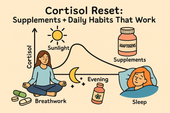
Cortisol Reset: Supplements + Daily Habits That Work
-
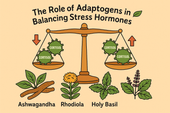
The Role of Adaptogens in Balancing Stress Hormones
Adaptogens work at the root of stress — your nervous system. 🌿 Learn how these powerful herbs help regulate cortisol, calm your nerves, and restore balance between energy and relaxation. ✨
-
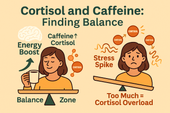
Cortisol and Caffeine: How Much Is Too Much?
Caffeine can boost energy and focus — but too much can overstimulate your stress hormones. ☕ Learn how caffeine affects cortisol, energy levels, and mood, and discover how to find the perfect balance for lasting calm and clarity. 🌿
-
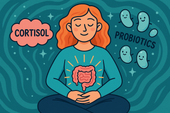
Cortisol and Gut Health: How Probiotics May Help
Chronic stress doesn’t just affect your mind — it changes your gut. 🌿 Learn how cortisol disrupts the microbiome and how probiotics can help restore balance, improve digestion, and calm your stress response naturally. ✨
-

Vitamin D and Cortisol: Supporting Immune Balance
Vitamin D does more than strengthen bones — it helps regulate cortisol and support immune balance. 🌞 Learn how this essential hormone-like nutrient restores calm, improves mood, and strengthens your body’s natural stress defenses. 🌿
-
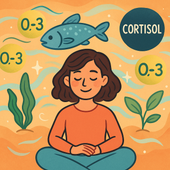
Omega-3s and Cortisol: Fighting Inflammation Naturally
Omega-3s are more than heart-healthy fats — they’re natural cortisol regulators. 🌿 Learn how EPA and DHA help reduce chronic inflammation, calm the nervous system, and support stress recovery from the inside out. ✨
-
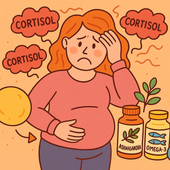
High Cortisol and Belly Fat: Can Supplements Help?
Chronic stress can make belly fat harder to lose — but supplements like ashwagandha, magnesium, and omega-3s may help restore cortisol balance. 🌿 Learn how science-backed nutrients support fat metabolism, calm your stress response, and bring your body back into harmony. ✨
-
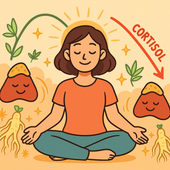
How Ginseng Can Support Energy and Cortisol Balance
Ginseng is one of nature’s most powerful adaptogens, helping your body handle stress without burning out. 🌿 Learn how this ancient root supports balanced cortisol, steady energy, and sharper focus — restoring vitality naturally and sustainably. ✨
-
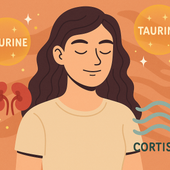
Taurine and Cortisol: Supporting Focus Under Stress
When cortisol surges, focus fades — but taurine helps restore balance. 🌿 Learn how this powerful amino acid calms your nervous system, regulates stress hormones, and sharpens concentration without jitters or fatigue. ✨
-
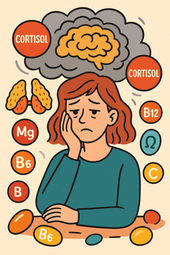
The Link Between Cortisol, Brain Fog, and Nutrient Deficiencies
When brain fog sets in, it’s not just in your head — it’s in your hormones. 🌿 Discover how cortisol imbalance and nutrient deficiencies like low magnesium, B vitamins, and omega-3s can cloud your focus and how restoring balance brings back mental clarity and calm. ✨
-
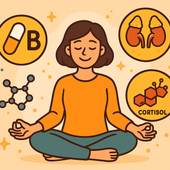
B Vitamins for Stress, Energy, and Cortisol Regulation
B vitamins are the foundation of stress resilience and steady energy. 🌿 Learn how this essential group of nutrients helps regulate cortisol, restore focus, and keep your nervous system calm — giving you balance from the inside out. ✨
-

Cortisol Imbalance and Chronic Fatigue: Can Supplements Help?
When chronic stress keeps cortisol high, fatigue and brain fog follow. 🌿 Learn how to rebalance your stress hormones naturally with calming nutrients, adaptogens, and lifestyle rituals that restore energy, focus, and inner peace. ✨
-

Adaptogen Stacks for Better Sleep and Lower Stress Hormones
Adaptogens can help your body recover from stress and sleep better by regulating key hormones like cortisol and adrenaline. 🌿 Learn how adaptogen stacks work to restore balance, calm the mind, and rebuild resilience — so you can rest deeply and wake renewed. ✨
-

Phosphatidylserine for Nighttime Cortisol Control
When stress hormones stay high at night, deep rest becomes impossible. 🌙 Discover how phosphatidylserine helps calm the brain, reduce nighttime cortisol, and restore healthy sleep rhythms — so you can wake up peaceful, clear, and recharged. ✨
-

Magnesium for Stress Relief and Cortisol Reduction
Magnesium is one of the most powerful natural tools for stress relief. 🌿 This essential mineral calms your nervous system, lowers cortisol, and helps your body recover from chronic tension. Learn how magnesium replenishes balance, improves sleep, and restores inner peace — naturally. ✨
-

Supplements to Improve Sleep by Balancing Cortisol
When cortisol stays high at night, sleep becomes a struggle. 🌙 Discover natural supplements that calm the nervous system, lower stress hormones, and restore your body’s natural rhythm. From magnesium and ashwagandha to L-theanine and phosphatidylserine, learn how to build deeper, more restorative rest. 🌿
-

Cortisol and Sleep: Why Stress Keeps You Awake
When stress keeps your body in fight-or-flight mode, cortisol refuses to calm down — and sleep becomes impossible. 🌙 Learn how elevated cortisol disrupts your circadian rhythm, suppresses melatonin, and turns restless nights into exhaustion. Discover how to restore balance and reclaim deep rest. ✨
-

L-Theanine for Cortisol Balance and Anxiety Relief
L-Theanine — the calming amino acid from green tea — helps quiet the mind and balance cortisol, the body’s key stress hormone. 🌿 Learn how it promotes calm focus, eases anxiety, and supports deep rest without sedation, backed by modern research and centuries of tradition. ✨
-

Rhodiola Rosea and Stress Resilience: A Natural Cortisol Regulator
Rhodiola rosea is one of nature’s most powerful tools for resilience. 🌿 This Arctic root helps balance cortisol, fight fatigue, and sharpen focus — keeping you calm yet energized even under stress. Discover the science behind Rhodiola’s adaptogenic power and how it helps your body thrive under pressure. ✨
-

Ashwagandha for Cortisol Balance: What the Science Says
Ashwagandha helps your body recover from chronic stress by calming the adrenal system and balancing cortisol — your key stress hormone. 🌿 Learn what science says about this powerful adaptogen, how it restores energy and focus, and why it’s one of nature’s most effective tools for modern stress relief. ✨
-

Supplements That Naturally Lower Cortisol Levels
When cortisol levels calm, your energy transforms — no more crashes or jitters, just steady focus and inner peace. 🌿 Learn which natural supplements and habits lower stress hormones, boost calm energy, and help your body thrive with balance instead of burnout. ✨
-

What Is Cortisol Imbalance? Symptoms You Shouldn’t Ignore
Cortisol — your body’s main stress hormone — keeps you alert and energized, but when it’s out of balance, it can drain your health. 🌿 Learn the signs of cortisol imbalance, from fatigue and anxiety to sleep disruption and stubborn weight gain, and discover how to restore calm, energy, and hormonal harmony naturally. ✨
-

The Best Daily Multivitamins for Menopausal Women
Menopause brings new nutritional needs that your old vitamin routine may no longer meet. 🌿 Discover how the right daily multivitamin can boost energy, balance mood, support bone and heart health, and keep your skin glowing. Learn which nutrients truly matter — from vitamin D to magnesium and B12 — to feel strong and vibrant every day. ✨
-

Antioxidants and Menopause: Fighting Inflammation Naturally
During menopause, oxidative stress and inflammation can quietly accelerate aging, fatigue, and skin changes. 🌿 Learn how antioxidants — from vitamins C and E to polyphenols in berries and green tea — help neutralize free radicals, reduce inflammation, and restore balance naturally. Discover the science of radiant, resilient aging. ✨
-

How CoQ10 Supports Heart Health After Menopause
After menopause, heart health becomes more important than ever. ❤️ Discover how CoQ10 — your body’s natural energy molecule — supports cardiovascular strength, restores vitality, and protects against oxidative stress. Learn how this essential nutrient helps keep your heart energized, balanced, and resilient through every stage of life. 🌿
-

Collagen Supplements for Skin and Joint Health Post-Menopause
After menopause, collagen loss affects both skin elasticity and joint comfort — but supplements can help rebuild from within. 🌸 Learn how collagen peptides, vitamin C, and other nutrients work together to restore firmness, reduce stiffness, and keep you glowing and mobile well into your next chapter. ✨
-

Calcium and Vitamin D: Protecting Bone Health in Menopause
Menopause brings hormonal changes that can weaken bones—but with the right nutrients, strength and stability can be rebuilt. 🦴 Learn how calcium and vitamin D work together to protect bone density, prevent fractures, and keep your body resilient. This guide explores nutrition, sunlight, and lifestyle habits that help your bones stay strong and vibrant for years to come. ☀️💪
-

Adaptogens for Energy and Resilience During Menopause
Feeling drained or emotionally scattered during menopause? 🌿 Discover how adaptogenic herbs like Ashwagandha, Rhodiola, and Ginseng can restore energy, balance cortisol, and build emotional resilience. Learn how these natural allies work with your body—not against it—to help you stay strong, focused, and calm through life’s hormonal changes. 🌸
-

Supplements That Help Beat Menopause Fatigue
Menopause fatigue can feel like more than tiredness—it’s a total energy crash. This guide explores how specific supplements, mindful breathwork, and therapy can help restore balance. Learn how nutrients like B vitamins, magnesium, and adaptogens rebuild your stamina, while breathwork and emotional healing calm your nervous system and bring vitality back to your days. 🌿✨
-

Herbal Blends for Menopausal Restlessness: Finding Calm in Transition
Herbal blends bring the wisdom of nature into moments of rest and renewal. Discover how soothing herbs like chamomile, lemon balm, and ashwagandha work together to calm menopausal restlessness, balance hormones, and invite deep relaxation. 🌿💫
-

Magnesium + Glycine for Deep Sleep During Menopause
Nutrients like magnesium, glycine, and B vitamins form the foundation for deep, restorative sleep during menopause. Discover how these natural compounds calm your nervous system, balance hormones, and help you wake up refreshed and recharged. 🌿💤
-

Melatonin and Menopause: Restoring Your Sleep Cycle
Nutrients are the foundation of hormone balance and energy. Learn how vitamins, minerals, and whole foods like greens, salmon, and berries nourish women’s bodies during menopause and beyond — restoring vitality, mood, and strength. 🌿🥗
-

How L-Theanine Helps With Menopausal Anxiety
Science continually deepens our understanding of the human body, from hormones to neurotransmitters. Discover how evidence-based research shapes modern wellness — bridging natural medicine, neuroscience, and hormone balance for healthier living. 🔬🌿
-

Can Ginkgo Biloba Improve Memory in Menopausal Women?
Hormone therapy can be a powerful tool for easing menopause symptoms and restoring balance. Learn how it works, the types available, and how to combine it safely with lifestyle and natural support for optimal well-being. 🌸💊
-

B Vitamins for Mental Clarity During Menopause
Nutrients are the foundation of mental and physical balance during menopause. Discover how vitamins, minerals, and whole foods like leafy greens, fish, nuts, and citrus can fuel energy, clarity, and calm while supporting hormonal health. 🌿✨
-

Mood Swings and Menopause: Natural Nutrient Support
Probiotics do more than support digestion — they help balance mood, hormones, and immunity too. Learn how a healthy gut microbiome can ease menopause symptoms, boost energy, and improve emotional resilience naturally. 🌿🦠
-

Brain Fog in Menopause: Supplements That May Help
Supplements can be powerful allies in restoring balance, energy, and focus—especially during menopause. Learn how nutrients like omega-3s, vitamin D, magnesium, and herbal adaptogens work together to support brain health, reduce stress, and promote lasting vitality. 🌿💊
-

Adaptogen Stacks for Reducing Night Sweats
Hormone detox isn’t about cleansing your body—it’s about restoring flow. Learn how the liver, gut, and endocrine systems work together to eliminate hormone buildup and how herbs like milk thistle, dandelion, and schisandra support balance, clarity, and natural vitality. 🌿💫
-

Cooling Menopause Symptoms with Herbal Support
Ashwagandha is one of nature’s most powerful adaptogens, helping women manage stress, sleep better, and balance hormones naturally. Discover how this ancient root supports calm energy, emotional resilience, and relief from menopause-related anxiety and fatigue. 🌿💫
-

Evening Primrose Oil and Menopause: What the Research Says
Hot flashes are one of the most common—and frustrating—symptoms of menopause. Discover what causes them, why the body’s “internal thermostat” becomes unbalanced, and the natural supplements and lifestyle shifts that can help you cool down, rest better, and feel more in control. 🔥💧
-

How Black Cohosh Helps with Menopausal Symptoms
Sleep disturbances are among the most exhausting symptoms of menopause—but they don’t have to rule your nights. Discover how natural strategies and calming supplements can help you fall asleep faster, stay asleep longer, and wake up feeling truly restored. 🌙💤
-

Natural Supplements That May Reduce Hot Flashes
Hot flashes can disrupt sleep, confidence, and daily comfort—but natural relief is possible. Discover the best research-backed supplements like black cohosh, red clover, and licorice root that may reduce hot flashes, balance hormones, and restore inner calm during menopause. 🌿💫
-

Omega-3s and Menopause: Supporting Mood and Inflammation
Omega-3 fatty acids are essential for hormonal harmony, brain function, and emotional balance—especially during menopause. Learn how these healthy fats reduce inflammation, support heart health, and restore calm, vitality, and focus through every stage of midlife. 🌊💫
-

The Role of Vitamin D in Menopausal Health
Vitamin D plays a powerful role in menopausal health—supporting bone strength, hormone balance, and mood stability. Discover how optimizing your vitamin D levels can improve sleep, energy, and emotional well-being while protecting long-term vitality through every stage of menopause. 🌞💪
-

Magnesium for Menopause: Relaxation, Sleep, and Hormonal Support
Self-regulation is the art of staying calm, centered, and in control—no matter what life throws your way. Learn how to strengthen emotional balance, manage stress responses, and cultivate inner peace through mindful techniques that reconnect your heart, body, and brain. 🌿💫
-

Can Adaptogens Like Ashwagandha Ease Menopausal Symptoms?
Brain fog during menopause can make even simple tasks feel overwhelming—but you’re not losing your sharpness, your hormones are simply shifting. Discover how adaptogens like ashwagandha and key nutrients can restore mental clarity, balance cortisol, and bring calm focus back to your day. 🌿🧠
-

Supplements That Support Hormonal Balance During Menopause
Herbal supplements have supported women’s health for centuries—and modern science is finally catching up. From ashwagandha and maca to red clover and rhodiola, discover how nature’s most trusted herbs can calm stress, balance hormones, and enhance energy through every life stage. 🌿✨
-

The Ultimate Motivation Stack: Supplements That Work Together
Discover how therapy helps restore motivation, focus, and emotional balance alongside supplement and mindset strategies. This empowering article explores how addressing thought patterns and emotional blocks through therapy can complement biochemical tools for long-term drive and well-being. 🧠💬
-

Entrepreneurial Drive: Can Supplements Help You Avoid Burnout?
Entrepreneurship demands energy, creativity, and mental resilience—but without balance, it leads to burnout. This in-depth article explores how nootropic supplements, adaptogens, and mindset tools can help entrepreneurs sustain motivation, manage stress, and keep their drive sharp for the long haul. 🚀💼

















































